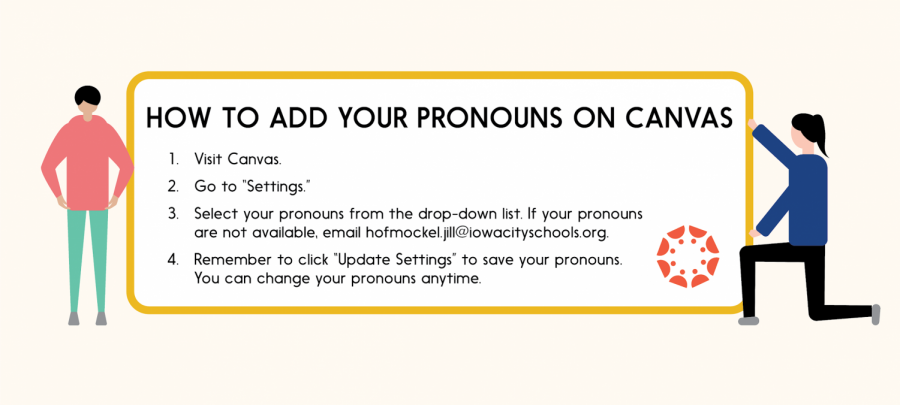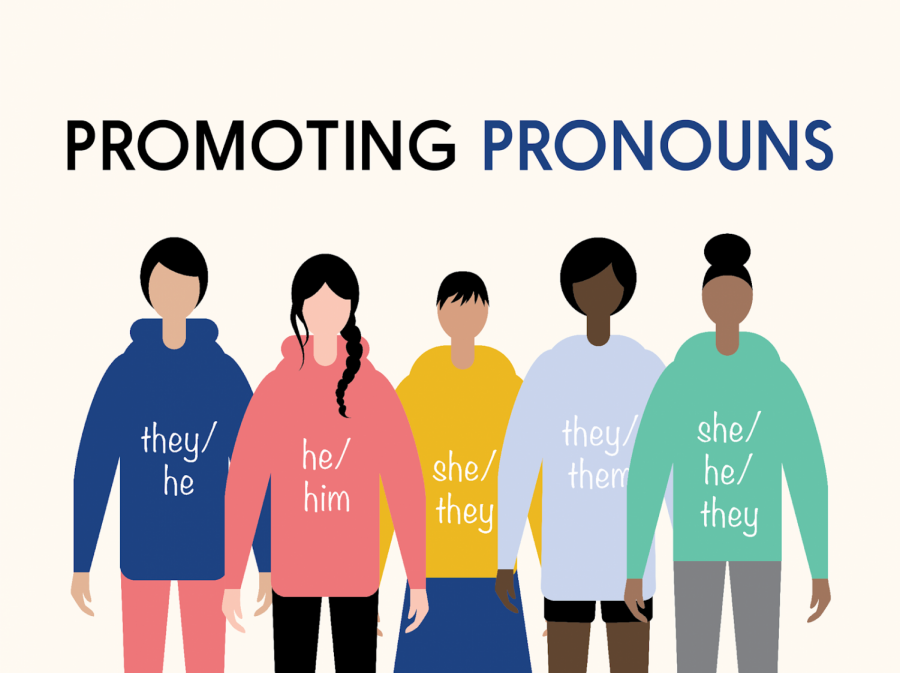Promoting pronouns
The WSS Editorial Board implores West High students and staff to share their pronouns in the classroom.
Normalizing the sharing of personal pronouns promotes an inclusive learning environment for students and staff alike.
This is an editorial. An editorial, like news reporting, is based on objective facts. However, its purpose is to share conclusions and opinions that have been derived by our Editorial Board and are not associated with the news staff.
In 2015, the WSS Editorial Board was divided on whether teachers should ask students for their pronouns, with some editors describing the sharing of pronouns as an added complexity and “unneeded accommodation.” However, the current editorial board has a new stance: sharing pronouns is an integral part of cultivating acceptance in the classroom. As the school year begins, this is especially crucial as many return to West High for the first time in over a year. Teachers and students alike should strive to normalize the sharing of pronouns in the classroom, as it encourages others to do the same and creates an inclusive learning environment.
Pronouns refer to someone without using their name. In English, the most commonly used pronouns to refer to others are she and he, which often indicate gender — a complex set of social expectations about behavior, characteristics, and thoughts. Some may use gender-neutral pronouns or neopronouns, such as they/them or ze/zir, or a combination of pronouns, like she/they or he/they. In the past decade, the use of they/them pronouns in school and the workplace has increased significantly, with Merriam-Webster choosing “they” as the 2019 Word of the Year. While many use their pronouns to express their gender identity, pronouns describe an identity — not define it. Sharing pronouns promotes respect, celebrates individuality, and welcomes everyone to a group without assuming their gender identity based solely on appearances. By regularly sharing our pronouns in the classroom, we affirm the significance of doing so and encourage others to do the same. Most importantly, using someone’s pronouns demonstrates understanding and acceptance, a vital part of any inclusive space.
The start of school is a difficult transition period for both students and staff, and this time may pose a particularly daunting task for some: introductions. For some, sharing pronouns can evoke vulnerability, while others may see it as an inconvenience. Students should not have the burden of telling their teachers and classmates their pronouns on a case-by-case basis; everyone should share their pronouns just as they would their name. Instead of being an alienating identity marker, pronouns can become standard, included in all introductions and get-to-know-you activities. When individual identities are acknowledged, a strong sense of belonging will ensue, and students can succeed as their authentic selves.

The sharing of pronouns extends beyond a single conversation; everyone must respect others’ pronouns just as they would names. Moreover, pronoun sharing should be a school-wide expectation in both the classroom and on virtual platforms, such as Canvas and Infinite Campus. Using someone’s pronouns promotes West’s fundamental, student-centered goals of kindness, community, and learning. If someone accidentally uses the wrong pronouns to address a student, they should correct themselves and move on, as making mistakes is part of any learning process. However, if an individual repeatedly and purposely misgenders a student, administrators must take swift action for the sake of safety. According to the Trevor Project, individuals whose pronouns were respected by all or most of the people in their lives attempted suicide at half the rate of those whose pronouns were not respected. Affirming others’ pronouns is not just the right thing to do — it is a means of promoting well-being and success.
Sharing pronouns, through both in-person and virtual means, is an essential step in creating a safe, inclusive learning space for everyone, regardless of gender identity. To foster success and growth, the values espoused by West High, everyone must feel valued as their true selves. As the school year settles in, now is the time for students and teachers to share their pronouns and, most importantly, respect others’ pronouns. Pronouns are more than just words to refer to people; they reflect a profound, personal sense of identity.
Your donation will support the student journalists of West High School. Your contribution will allow us to purchase Scholarship Yearbooks, newsroom equipment and cover our annual website hosting costs.

(she/they) Sachiko is a senior at West, and this will be their 3rd year on staff. She is a design editor and photographer for the print publication. In...



